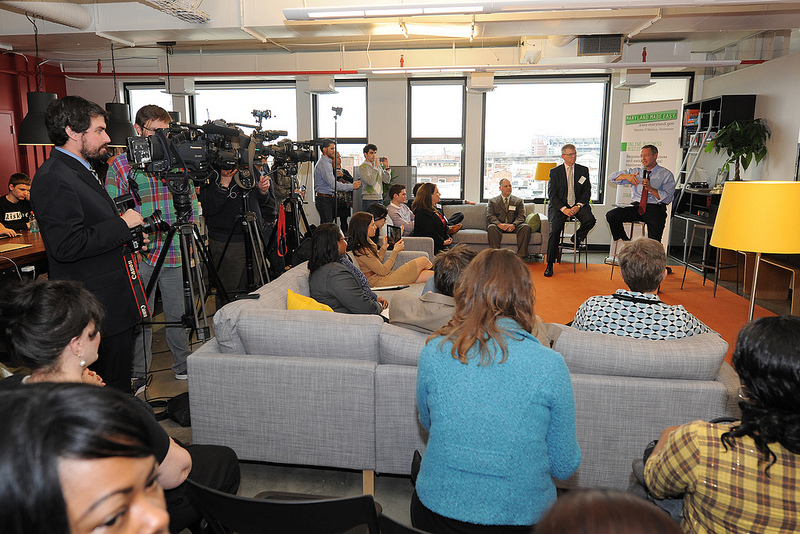Coworking has gone from fringe subculture of independent workers and technologist freelancers to the cutting edge of the modern workplace.
The idea to find a community to work within for collaboration and as a way to get the benefits of a bigger workplace for smaller teams at more affordable rates has taken root throughout the country.
take a run at it, supported by Brennan.
Each coworking space has its own personality. Some are just real estate offerings, with little more than coffee and a place to plop down between meetings. Others are more elaborate spaces, with furnished offices, opportunities for social and professioanl gathering, support staff and a clear mission or identity.
As coworking has grown in popularity, there is a real clarifying moment too. General Assembly is focusing on classes, rather than space and 3rd Ward, the seven-year-old maker and coworking space, closed its doors in Brooklyn and Philadelphia after expanding too quickly.
So it helps to know what works and what doesn’t.
Across many of them, here are some of the features that the best coworking spaces have in common and are worth thinking about when you are choosing your own.
Space Identity
When choosing a space to work out of, before looking at the amenities, it might help to know how the space sees itself. What do the members say bring them together other than the actual office space?
In Philadelphia, there is a new independent game development space called Philly Game Forge where the members say building good games that they would play themselves is part of their identity.
It also helps to have diverse membership who help you broaden your own awareness. Does the coworking space you’re looking at have different kinds of people, with different backgrounds and experiences or a focus on a particular skill set? Both can be valuable, but you should know why you’re choosing the space you’re in, and its location might not be the only reason.
Free Perks
It’s the standard for coworking spaces to offer free Internet and coffee and a place to plop your laptop down. So you should understand what else the space is offering.
Others are stretching even further. Newly opened and quickly popular HarlemGarage in Manhattan has partnered with Verizon FiOS Quantum to offer (free) fiber optic Internet. Some places offer snacks, such as popcorn, ice cream, and candy bars. And other places, such as San Francisco’s Citizen Space, let you bring your pet to the office. In Cairo, 302labs provides a TV and Xbox for workers who need to take a breather.
Those guilty pleasures are also social tools to help people in the space connect with each other.
Breakout or Private Space
Once you like the identity of the space, it does help to make sure it has what you need.
Not every place can offer traditional conference rooms, but when you have the urgent private client call or want to get a creative with a loud conversation, it helps to know there is some place you can go.
While many spaces encourage collaborative workspaces, such as shared tables and open air offices, others also offer private offices and multi-desk options. Some spaces offer couches, fireplaces, themed art work or really anything that might seem shallow at first but also are opportunities to spark new thinking.
Sometimes open offices can create stress and might lead to less productivity for those not ready for the environment.
If you know you’re someone who gets distracted easily, there are other coworking spaces out there that offer fully-furnished private offices at decent prices. Communoloft in Montreal and Toronto offer furnished offices with telephone, voicemail, and Internet.
Career Growth Opportunities
Many spaces are geared toward entrepreneurs, and include regular lectures, meetings, and events that help young business people grow their startups. PARISOMA, in San Francisco, offers classes on topics such as programming, marketing, and design.
In Philadelphia, startup incubator Venturef0rth plans regular programming for community building and for value add to members.
In Baltimore’s Federal Hill, Betamore cofounder Mike Brenner calls his space an “education campus,” that happens to have coworking and incubation utilities.
Support Staff
Some spaces offer a secretary to greet visitors, and others have a whole team. CoCo, in Minneapolis, has a concierge who introduces new members to the rest of the coworkers, and keeps the snacks and coffee fresh. Gangplank employs staff to help entrepreneurs arrange meetings with contractors, mentors, and potential investors. A few places even offer their own set of business services.
Oficio, in Boston, offers in-house consultants for accounting, copywriting, web design, marketing, and more.
Though the idea of a collective might mean that the members of a coworking space drive it forward, it is still helpful for someone to keep the trains running on time.
It’s Not an Office, It’s a Community
Many of the coworking spaces are geared to a specific type of worker, and encourage socializing and collaborating among the tenants. The Fueled Collective, as suggested by its name, considers itself more a collective than a coworking space. Its space has been designed with tech startups in mind. Paragraph,in New York, is created by writers, for writers. The space is specifically designed for writers, and has a shared lounge where writers can work together.
In Old City Philadelphia, Independents Hall cofounder Alex Hillman says often that the “space” is the least important part of coworking. It’s ultimately about building a new network of how people work together. Everything else is gravy.







